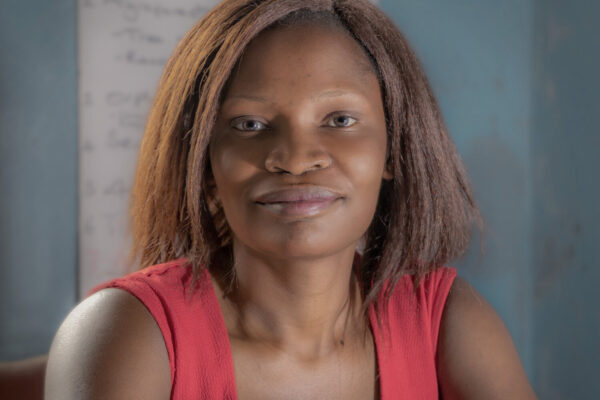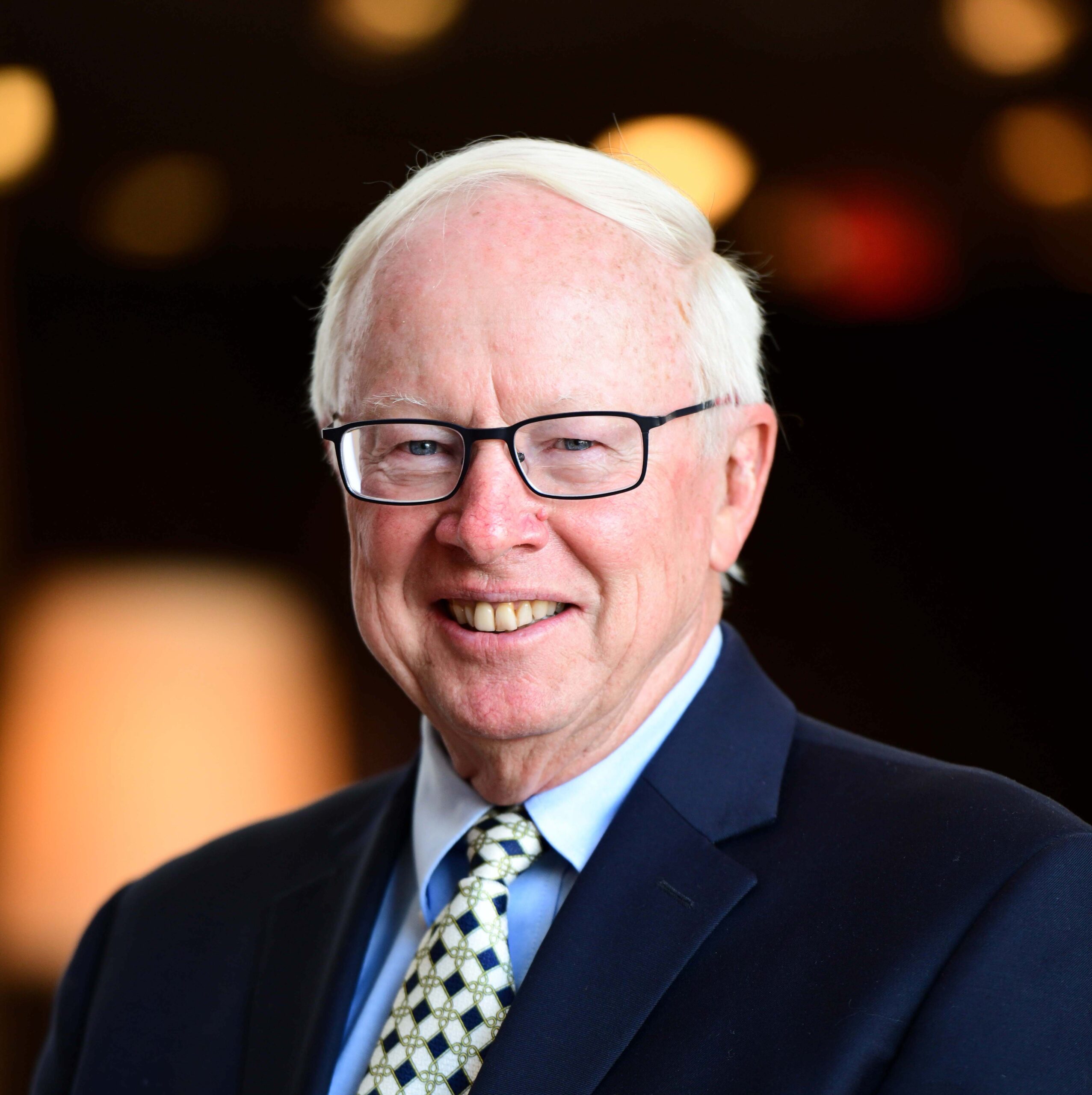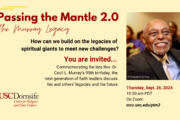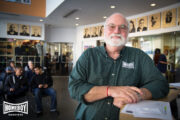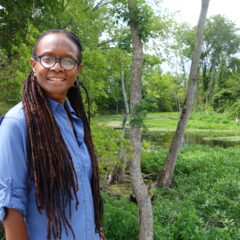This article was originally published in Religion Unplugged, with the support of CRCC’s global project on engaged spirituality.
In my last international trip before the pandemic, I had the chance to interview a young woman who started the Othakarhaka Foundation at age 26 in Malawi, one of the poorest countries in Africa. In response to an act of kindness by a stranger, she started a program in her local village that has nearly 4,000 volunteers who assist the elderly, promote the education of orphans, and plant trees to counter the deforestation caused by inefficient cooking practices.
Through her foundation, which means “Passing on the Kindness,” Ida Puliwa has developed new agricultural approaches that have more than quadrupled the production of maize for many elderly people. She is also sending girls to secondary school, including some who had entered forced marriages. And the several thousand volunteers actually pay a monthly fee to work in the various projects—which is part of her vision to make them self-sustainable.
As her story unfolded, a complex web of relationships emerged. Yes, Ida is a remarkable person; she would be a great candidate for a CNN Hero’s Award. But I also started to see that heroes don’t exist in isolation. They are part of a tapestry of interweaving relationships, random chance events, personal grit and response to moral challenges. Ida is the type of exemplar that we need at this difficult time in our lives. And, yes, she is motivated by her religious faith and sustained on a daily basis by her spiritual practice of prayer and worship at her local Pentecostal church.
“You Can Be Different”
Ida Puliwa was born in 1987 in a small village in the southern region of Mulanje, Malawi. When her mother’s fourth child was born, who once again was a girl, her father’s relatives insisted that he take a second wife who might give him a son, but he refused. This meant that they had to leave their village and move to the mother’s village about two miles away.
Ida’s father was deeply embarrassed by the discrimination against his wife, and decided that he would make his daughter, Ida, the envy of all the families with male children. Throughout primary school, he worked with Ida on her math homework and reading. As a result, she was often first in her class.
When Ida was only 4 or 5, her 11-year-old sister Gloria died from malaria because the hospital was out of medication. Although her mother could have bought medication from the local pharmacy, she didn’t have any money since her husband was away in the capital city of Lilongwe looking for work.
When she was 11, Ida was able to travel in the back of a truck with other students to Blantyre, the commercial center that was several hours away. There she saw women wearing trousers. Ida remembers asking her teacher, “Is this Malawi?” And the teacher replied that if she worked hard at school and went to college, she could look like them.
When she returned home, her father said, “Yes, that’s what I’ve been trying to tell you. You can be different. You can be like someone that the whole village never had.” She was inspired; she wanted to wear trousers and have hair extensions like the women she had seen in Blantyre.
An Education
Beginning at age 12 or 13, many girls were getting married—typically as second or third wives. Especially for orphans, there was economic pressure to marry if they wanted to eat. Girls were going to initiation ceremonies where they were encouraged to sleep with men, and many returned home pregnant.
After returning from Blantyre, Ida felt isolated from many of her friends who were having children at young ages. But because of her high rank in primary school, Ida was selected to attend Mulanje Secondary School as the first girl in her village to attend a boarding school away from home.
In secondary school she learned that young people were dying, not because they were bewitched, but because they had AIDS. The superstitions of the villagers disturbed her. She rejected the commonly held view that elderly women were witches, causing the deaths of younger people.
Because it was so unusual for a village girl to go to secondary school, her story was written up in a local paper. Her uncle, who was living in South Africa, read the story on-line and offered to pay her tuition to go to Mzuzu University, where she studied Information and Communication Technology.
Unfortunately, during her second year of study, the uncle was killed in an auto accident along with his girlfriend, and that ended her college education.
Her dream of education shattered, she got a job hoping to save money for tuition, but her salary was so low that she could barely pay rent and feed herself. Although very discouraged, she started writing letters to dozens of potential funding sources; no one replied.
Then one day a translator was needed for a program in her village put on by the YWCA of Malawi. Her mother was a volunteer at the event and suggested that her daughter knew English and could translate. After this program, a professor from Virginia Tech, Marquita Hill, was so impressed that she told Ida to email her story and she would see if she could find a sponsor to continue her education. Ida had little hope that this random stranger would come through, given the lack of response to her earlier inquiries for help.
But this was a game-changer. Not only did Marquita pay her tuition, she also bought her a laptop computer, some clothes and even supplied pocket money.
Extremely grateful for this turn in her fortunes, Ida told Marquita that she wanted to pay back the money that was given to her, but Marquita refused and instead said to find someone else that she could help.
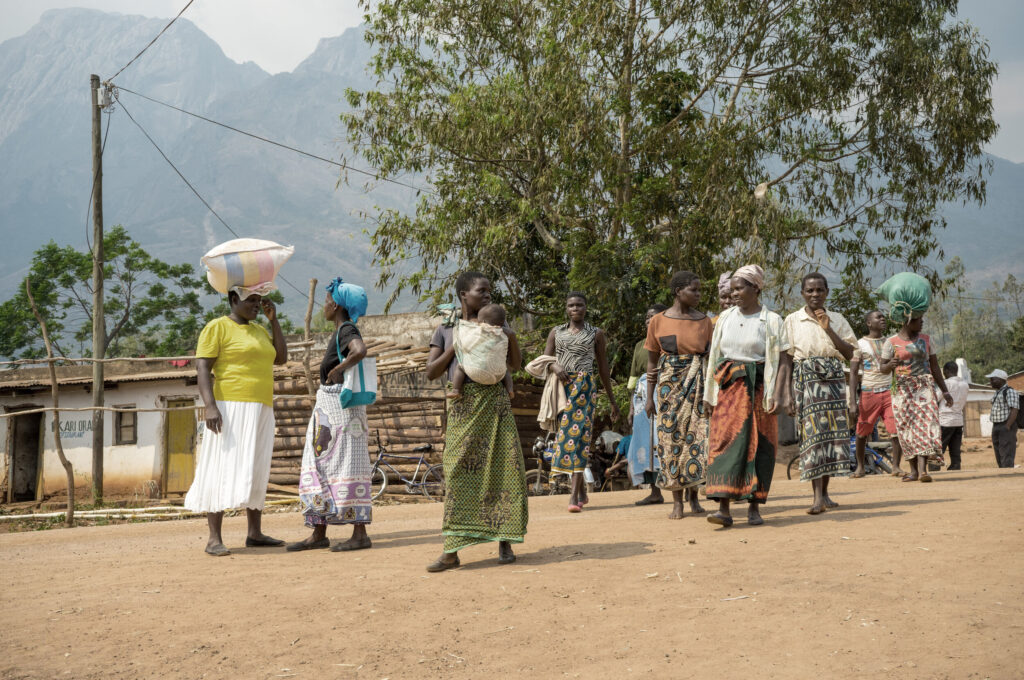 Women of Ida’s local village in Malawi. Photo by Patti Fortlage.
Women of Ida’s local village in Malawi. Photo by Patti Fortlage.
A Chance To Pay It Forward
Ida took her benefactor’s admonition seriously and, while still a student, returned to her village and met with the chief, proposing that she would like to organize a group of volunteers that would care for the elderly in the surrounding villages, especially those who were raising orphans, since the AIDS epidemic had taken a huge toll on the population.
When he asked her why she wanted to do this, she said that someone had helped her and she wanted to pay back the kindness. He said, “So you want to pay back the kindness? And you want to do this in my village?” She said, “Yes.” And he said, “You’re just a girl! Maybe if you were a boy or a man, I would allow it. But I know that girls cannot do anything.”
When she went back to school, the words kept echoing in her mind: “No. You’re just a girl.” But simultaneously, she kept remembering the statement of her father that she could be the person that the whole village never had.
So, two weeks later she went to a chief of a different village, who happened to be a woman. The chief listened carefully and said, “Okay, I’m going to support you. I’ll go to your chief and I’ll talk to him and other chiefs as well. We’ll give you a chance. After all, I’m a woman like you.”
Eight neighboring chiefs of villages agreed to a community meeting and 4,000 people showed up. Ida told her own story about wanting to pass on the kindness of a stranger and pitched the idea of people volunteering to help the elderly in their community.
To her great disappointment, only 65 people indicated they wanted to be volunteers. Four of them were men, including her own father. But she pushed forward.
One of the first steps Ida took after her initial call for volunteers was to do a formal survey of the needs of people in their villages. She found that the elderly population was living in extreme poverty. Nearly 80% had lost spouses and other loved ones who might support them, and because of the AIDS epidemic many were caring for grandchildren and even great grandchildren. Their homes were in poor condition; basic sanitation was lacking; there was no one to bathe them or help clean their houses; their gardens were going untended; and they had no transport to get medical care.
Ida decided that she needed to raise money, so she established a policy that every volunteer would pay 50 Kwacha a month—about 7 cents. She also started doing various public fundraisers, from variety shows to car washes. At school, she repaired computers for fellow students, and she also collected soap, sugar, clothes and small donations from her friends that she took back to her village.
From the beginning, Ida wanted to reverse the expectation that outsiders were the solution. They should be self-sustaining. So, with the small monthly dues, and as the number of volunteers grew into the hundreds, they were able to buy plastic sheeting to underlay the thatched roofs of elderly people, and engage in a number of self-help projects that simply required volunteer labor, such as digging pit latrines and cleaning the homes of the elderly.
Jan. 19, 2011, was the community meeting where she shared her vision. The next day, she organized the first board meeting. Jan. 24-26, volunteers conducted the survey of the needs of the elderly. On Jan. 31, they discussed the survey results and drew up a constitution for what was to be called Othakarhaka, which translated meant “Passing on the Kindness.” In 2013, the Othakarhaka Foundation became a legally recognized non-profit organization in Malawi.
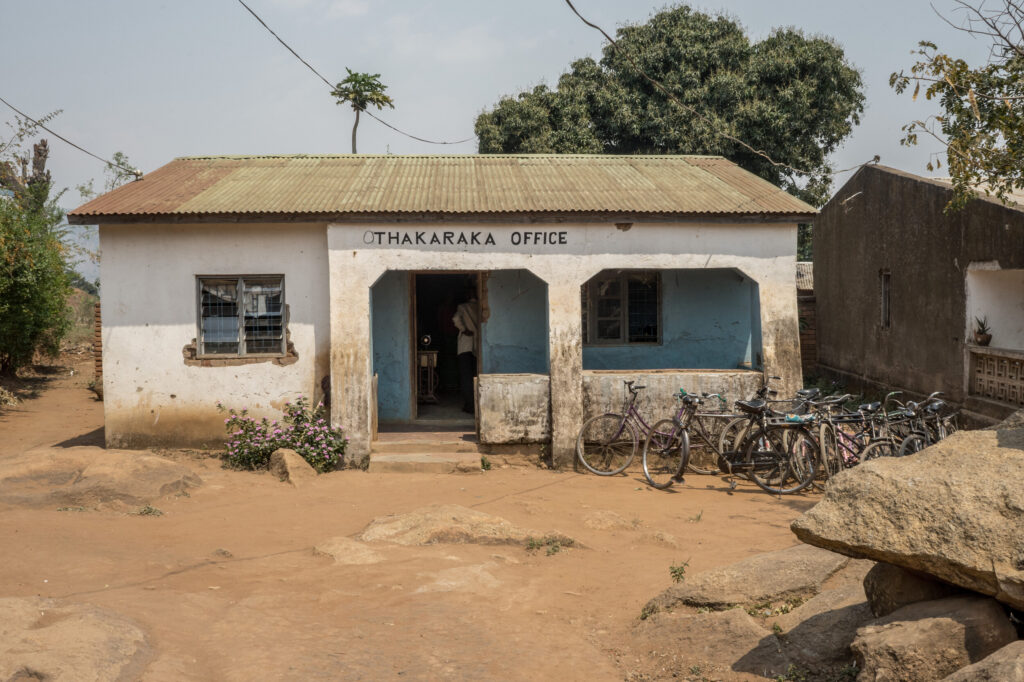 The office of the Othakaraka Foundation. Photo by Patti Fortlage.
The office of the Othakaraka Foundation. Photo by Patti Fortlage.
Responding To Villagers’ Needs
One of the problems facing people, and the elderly in particular, was that they were only planting one crop of maize a year, which could barely provide for their needs, let alone enable them to sell any surplus to buy other essential items. It was at this point that Ida’s ingenuity and exposure to higher education came into play.
By chance, she had seen a short clip on TV about piping water from a lake to irrigate crops. At school, she had also learned about hybrid maize seeds that grew very fast with a little bit of synthetic fertilizer.
Othakarhaka didn’t have money to purchase pipes, but volunteers could dig shallow ditches by hand to bring water from nearby streams and rivers. This meant that villagers could plant two crops a year, one during the rainy season and one during the dry season. And with the hybrid seeds, they could have bumper crops in three months, twice a year.
Marquita Hill, the same person who had funded Ida’s tuition, gave them a grant of $2,500 to get started on buying hybrid seeds and fertilizer. The Sustainable Agriculture Project is now self-funding. Rather than getting only two bags of maize a year, many elderly farmers are getting a dozen 50 kilo bags a year.
Practicing the ethic of “passing on the kindness,” elderly recipients give a bag of maize from their surplus to another person in need, and then sell their additional maize to care for orphans in their household or other expenses.
As these elderly farmers began to generate extra income, they needed to be able to deposit their money in a bank account. But when Ida took 87 women to the local bank, she discovered that none of them could write their name or signature. They had grown up in the period prior to free primary education and were illiterate.
This problem stimulated the idea for the Adult Literacy Program, in which students teach their elders. The first class had 450 students that they divided into groups of 50, where they learned basic literacy and how to solve simple math problems. Students supported by Othakarhaka became their teachers.
Ida was surprised to see two chiefs in the first class. They also wanted to learn to read and write, even though they had refused to participate when she first started Othakarhaka.
Another problem confronting villagers was deforestation. The common practice for generations was that people put their cooking pot on three stones, which required a substantial fire to generate adequate heat, resulting in thousands of trees being cut down for firewood.
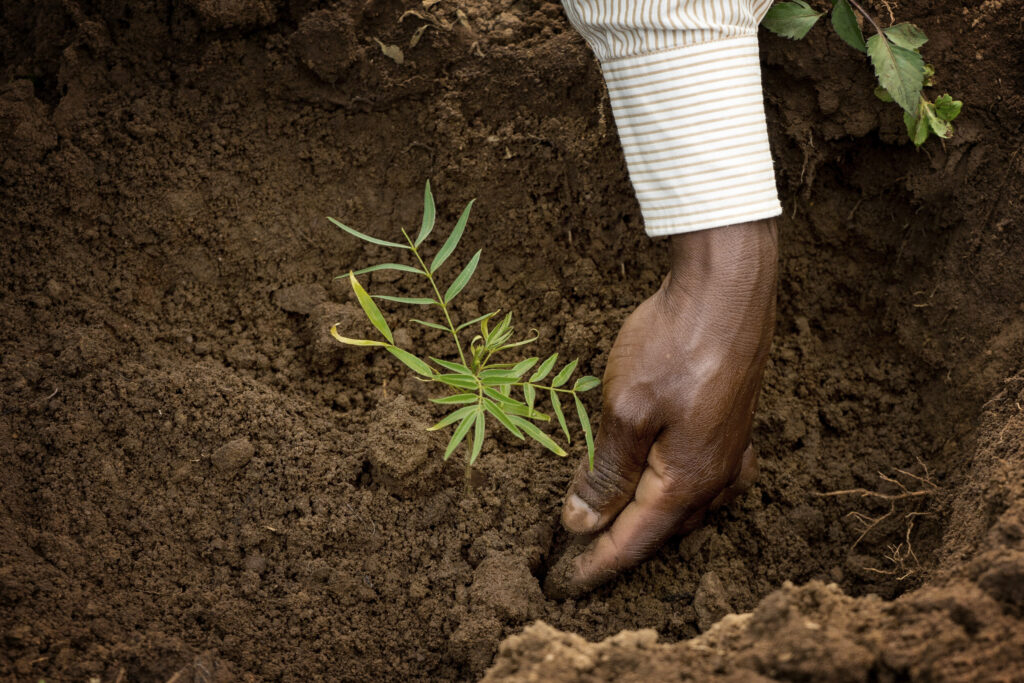 Planting trees has helped counter deforestation in the village. Photo by Patti Fortlage.
Planting trees has helped counter deforestation in the village. Photo by Patti Fortlage.
Othakarhaka has tackled this issue in two ways. First, it has pioneered a new type of “rocket stove” that uses 16 hardened bricks, a little bit of clay and cement, and burns a quarter of the fuel required by the more traditional means of cooking. Currently there are 5,000 of these stoves in use.
And second, Othakarhaka has started a massive tree planting effort. This year they will plant 850,000 trees: some for fuel, some are fruit trees; others have medicinal properties, and some are planted in farms because they contribute nitrogen to the soil. Volunteers who plant the trees are also responsible to water and care for them, resulting in a 90% survival rate.
In addition to the ongoing assistance to elderly persons, Othakarhaka is focused on providing secondary education for youth in the villages. One hundred dollars a year covers the cost for a year of tuition, school uniforms, shoes, a school bag and rice porridge for breakfast. While this may seem like a small amount of money, to villagers living on $500 a year, it is an insurmountable expense, so Othakarhaka is working with outside donors to fund the education of the top students graduating from primary school.
For girls that are not candidates for secondary school, Othakarhaka started a sewing school with the donation of ten sewing machines. An instructor teaches girls tailoring skills, and when they graduate they are given a sewing machine, with the expectation that they will pay back the cost so that another girl can enter the program within a year.
Two other projects warrant mention. Although there is free health care in Malawi, oftentimes there is no room in the hospitals for long-term care. Consequently, people with AIDS or cancer are sent home to die, oftentimes in pain. In response, a Canadian family foundation has provided funding for palliative care. Drawing on his training as a nurse, Ida’s husband Ted Mwango directs this program and serves as the operations manager for the foundation.
And finally, my friend Dr. Don Thomas, who first introduced me to Ida and his two daughters directs a dance and writing program during the summer, which further contributes to the goal of empowering young women and girls.
While some projects have required initial seed money to get going, Ida’s goal is for individual projects to be self-sustaining. In the case of paying school fees, this may take a while, but like Ida herself, the hope is that beneficiaries will pass on the kindness they experienced by helping others in their village.
What Motivates Ida?
It is easy to be “wowed” by what Othakarhaka has accomplished in less than a decade. My interest goes deeper, however. I have been trying to unravel the motivations that have led to this remarkable program and to ask the question of whether there are any lessons to be learned that might apply to other contexts, including Western countries.
In the case of Ida, her religious convictions cannot be separated from her moral values and daily life. Although she grew up in a Presbyterian household, in college she was drawn to the Pentecostal expression of worship, and subsequently she and Ted were married in a Pentecostal church and continue to identify with the optimistic theology of Pentecostalism.
In her view, the core principle of Christianity is “Love one another.” Elaborating she said, “You cannot say you love God if you fail to love your neighbor. How can you watch your neighbor suffer, yet say you are a Christian and claim that you know God and you love God?”
Ida also draws considerable strength from her belief that God is the bedrock of everything she does. Her favorite verse is from Psalms 121, which she quoted from memory: “I look to the mountain, where does my help come from? My help comes from the Lord, the creator of the universe. Our God does not sleep and slumber.”
When she confronts problems, she sometimes feels God is absent, but then realizes that maybe God is allowing a problem to make her stronger or push her forward. “I know God is here. . . He’s always there to watch us. He never sleeps, he never slumbers,” she says, referencing her favorite Psalm.
From One Act Of Kindness To Many
Moral principles, like “love your neighbor,” are always embedded in a larger life context. For Ida, she internalized the humiliation of her mother who gave birth only to girls. This humiliation, and perhaps outrage, was amplified by her village chief who said, “You are only a girl.” Early in her life, it was her father who played a key role by going against cultural values and committing himself to support her in being at the top of her class. And then, of course, an uncle paid for her initial tuition expenses and then Marquita Hill enabled her to complete her university education.
Without doubt, Ida is a unique person. She is smart, has tremendous grit, refuses to take “no” for an answer, and is a visionary who sees opportunities, makes connections, and has the charisma to communicate a message. Undergirding these attributes is someone with finely honed moral values that are rooted in a religious faith.
There are undoubtedly tens of thousands of women like Ida. At a time when countless individuals are taking initiative to respond to their community’s needs, the question remains whether their efforts will take root and make a lasting impact.
Perhaps it is too simple, but what individuals like Ida need is an intervention at a crucial point in their lives. Actually, they need multiple interventions—by a loving parent, a mentor, a complete stranger.
And if the project they launch is to go anywhere, it requires other people to catch the vision. Charisma, according to the great German sociologist, Max Weber, is not an individual property. It always has a social context. Without 4,000 volunteers, Othakarhaka would be nothing. If it were not meeting a need, it would not continue. And, yet, if it did not have an “Ida,” it would have never been a reality.
Read the article on religionunplugged.com.
Donald E. Miller is the co-founder of the USC Center for Religion and Civic Culture.
